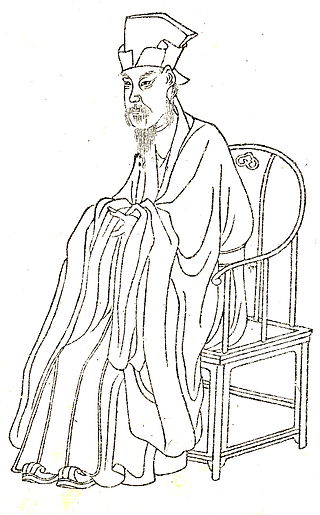Ma Zhu (馬注) (1640 – after 1710) was a Chinese Hanafi-Maturidi scholar. [1] [2] Ma was noted for his combining of Confucian and Islamic values in his philosophy. [3] [4]
Contents
| Part of a series on Islam in China |
|---|
 |
Ma Zhu (馬注) (1640 – after 1710) was a Chinese Hanafi-Maturidi scholar. [1] [2] Ma was noted for his combining of Confucian and Islamic values in his philosophy. [3] [4]
| Part of a series on Islam in China |
|---|
 |
Ma was born in Yongchang Fu in Yunnan Province during the reign of the Qing dynasty. His father died when Ma was young. He is claimed to be a descendant of Ajall Shams al-Din Omar, a Muslim Mongol general, and of Muhammad. [5]
Ma Zhu's philosophy focused heavily on social relations and interactions between the sexes. He theorized that, per Confucian and Islamic values, an ideal society would be one in which men dominated public affairs while women would serve in a subservient role as domestic helpmates. [3] The philosopher opposed women performing roles outside of the home, stating "even a talented woman should not take care of non-domestic affairs". Ma took inspiration for his ideal role for women from the story of Adam and Eve, in which Allah created Eve from the flesh of Adam. [3] This indicated to Ma that men and women were not intended to be of equal standing in society. Ma wrote:
"Husband and wife are one entity. However, created out of her husband, the wife should naturally obey him. Their love is locally described as dear as that between brothers and sisters."
Ma's philosophy also denoted the distinctions between the traditional Chinese paired forces of ming (命) and xing (性), and yin and yang. According to Ma, ming represented what was preordained by Allah, while xing represented by what was acquirable though social conditioning and exposure to earthly human existence. [3] Similarly, in Ma's view yin represented the earthly acquired and yang represented the divinely innate. Parts from both were required to form any human. Ma also believed that women should strive to be similar to famous women in Islam, he mentioned Moleyan (Maryam), Khadiyah, and Fatima as examples to follow. [3]
Ma also advocated for both men and women to pursue an Islamic education. [3]

Confucianism, also known as Ruism or Ru classicism, is a system of thought and behavior originating in ancient China, and is variously described as a tradition, philosophy, religion, theory of government, or way of life. Confucianism developed from teachings of the Chinese philosopher Confucius (551–479 BC), during a time that was later referred to as the Hundred Schools of Thought era. Confucius considered himself a transmitter of cultural values inherited from the Xia (c. 2070–1600 BC), Shang (c. 1600–1046 BC), and Western Zhou (c. 1046–771 BC) dynasties. Confucianism was suppressed during the Legalist and autocratic Qin dynasty (221–206 BC), but survived. During the Han dynasty, Confucian approaches edged out the "proto-Taoist" Huang–Lao as the official ideology, while the emperors mixed both with the realist techniques of Legalism.

Chinese philosophy originates in the Spring and Autumn period and Warring States period, during a period known as the "Hundred Schools of Thought", which was characterized by significant intellectual and cultural developments. Although much of Chinese philosophy begun in the Warring States period, elements of Chinese philosophy have existed for several thousand years. Some can be found in the I Ching, an ancient compendium of divination, which dates back to at least 672 BCE.

Wuxing, usually translated as Five Phases or Five Agents, is a fivefold conceptual scheme used in many traditional Chinese fields of study to explain a wide array of phenomena, including cosmic cycles, the interactions between internal organs, the succession of political regimes, and the properties of herbal medicines.

The Hui people are an East Asian ethnoreligious group predominantly composed of Chinese-speaking adherents of Islam. They are distributed throughout China, mainly in the northwestern provinces and in the Zhongyuan region. According to the 2010 census, China is home to approximately 10.5 million Hui people. Outside China, the 170,000 Dungan people of Kazakhstan and Kyrgyzstan, the Panthays in Myanmar, and many of the Chin Haws in Thailand are also considered part of the Hui ethnicity.

Zhu Xi, formerly romanized Chu Hsi, was a Chinese calligrapher, historian, philosopher, poet, and politician of the Southern Song dynasty. Zhu was influential in the development of Neo-Confucianism. He contributed greatly to Chinese philosophy and fundamentally reshaped the Chinese worldview. His works include his editing of and commentaries to the Four Books, his writings on the process of the 'investigation of things', and his development of meditation as a method for self-cultivation.
Shen Buhai was a Chinese statesman, reformer and diplomat. According to the Shiji, Shen Buhai served served as Chancellor of the Hann state under Marquis Zhao of Han, for around fifteen years to his natural death in office in 337 BC, ordering it's government and doctrines emphasizing administrate technique (shu). A contemporary of syncretist Shi Jiao and Shang Yang, Shen was born in the State of Zheng, and was likely a minor official there. After Han had completed the conquest and division of Zheng and Wei in 376 BC, Shen rose up in the ranks of the Han officialdom, reforming it's administration and military defenses about only a half century after it's founding.

Maturidism is a school of theology in Sunni Islam named after Abu Mansur al-Maturidi. It is one of the three creeds of Sunni Islam alongside Ash'arism and Atharism, and prevails in the Hanafi school of jurisprudence.

Islam has been practiced in China since the 7th century CE. There are an estimated 17–25 million Muslims in China, less than 2 percent of the total population. Though Hui Muslims are the most numerous group, the greatest concentration of Muslims reside in northwestern China's Xinjiang autonomous region, which contains a significant Uyghur population. Lesser yet significant populations reside in the regions of Ningxia, Gansu and Qinghai. Of China's 55 officially recognized minority peoples, ten of these groups are predominantly Sunni Muslim.

Zhou Dunyi was a Chinese cosmologist, philosopher, and writer during the Song dynasty. He conceptualized the Neo-Confucian cosmology of the day, explaining the relationship between human conduct and universal forces. In this way, he emphasizes that humans can master their qi ("spirit") in order to accord with nature. He was a major influence to Zhu Xi, who was the architect of Neo-Confucianism. Zhou Dunyi was mainly concerned with Taiji and Wuji, the yin and yang, and the wu xing.

Sayyid Ajall Shams al-Din Omar al-Bukhari was Yunnan's first provincial governor, appointed by the Mongol-led Yuan dynasty of China.

Yusuf Ma Dexin was a Hui Chinese Hanafi-Maturidi scholar from Yunnan, known for his fluency and proficiency in both Arabic and Persian, and for his knowledge of Islam. He also went by the Chinese name Ma Fuchu. He used the Arabic name Abd al-Qayyum Ruh al-Din Yusuf. He was also styled as "Mawlana al-Hajj Yusuf Ruh al-Din Ma Fujuh".

Wáng Dàiyú was a Chinese Hanafi-Maturidi (Hui) scholar of Arab descent. His given name was Ya, style name Daiyu. He called himself Zhenhui Laoren 真回老人 and went by his style name.

Liu Zhi, or Liu Chih, was a Chinese Sunni Hanafi-Maturidi scholar of the Qing dynasty, belonging to the Huiru (Muslim) school of Neoconfucian thought. He was the most prominent of the Han Kitab writers who attempted to explain Muslim thought in the Chinese intellectual climate for a Hui Chinese audience, by frequently borrowing terminologies from Buddhism, Taoism and most prominently Neoconfucianism and aligning them with Islamic concepts. He was from the city of Nanjing. His magnum opus, Tianfang Xingli or 'Nature and Principle in the Direction of Heaven', was considered the authoritative exposition of Islamic beliefs and has been republished twenty-five times between 1760 and 1939, and is often referred to by Muslims writing in Chinese.

During the Manchu-led Qing dynasty (1644–1912), Islam was a significant religion in Northwestern China and Yunnan. There were five major Muslim rebellions during the Qing period. The first and last rebellions were caused by sectarian infighting between rival Sufi Muslim orders.
In Chinese philosophy, fire is the second phase of Wu Xing.
Xuan Kong Flying Star feng shui or Xuan Kong Fei Xing is a discipline in Feng Shui, and is an integration of the principles of Yin Yang, the interactions between the five elements, the eight trigrams, the Lo Shu numbers, and the 24 Mountains, by using time, space and objects to create an astrological chart to analyze positive auras and negative auras of a building.

The Hundred-word Eulogy is a 100-character praise of Islam and the Islamic prophet Muhammad written by the Hongwu Emperor of the Chinese Ming dynasty in 1368. Copies of it are on display in several mosques in Nanjing, China.

Sailaifengye or Salafiyah refers to the Chinese Salafi Movement.
Qingzhen Zhinan (清真指南), also known as al-Murshid ilā ‘Ulūm al-Islām, is a philosophical treatise on Islam written by Chinese Hanafi-Maturidi scholar Ma Zhu and first published in 1683. It later became part of the Han Kitab, a collection of Chinese Islamic texts written in the late Ming and early Qing dynasties.